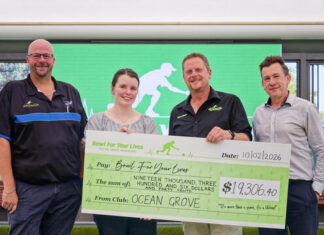Andrew Mathieson
TRACES of the Vietnam War have always surrounded the life of Highton’s Sue Eddy.
A young Sue witnessed first hand the pain an uncle suffered years after the unwanted conflict.
“He was an angry bastard,” she tells.
“He had the tatts, the angry attitude and he drank heavily.
“I didn’t know anything more than that about him – he’d never talk.”
Such personal insight into post-traumatic stress disorder – something that never had a name when the vets returned from Vietnam – would prove invaluable.
The now-42-year-old was destined to be a nurse of sorts because of, rather than despite, a tough upbringing.
“I came from a long line of nurses,” Sue nods.
“Three generations but probably more, with aunts, cousins, you name it – everyone was a nurse.”
After her parents divorced, the family was uprooted from a farm on the NSW border to nearly 300km away.
Mum worked night shifts on the weekends at Werribee hospital to make ends meet.
Sue admired her mum and had always mimicked the doting nurse as a kid.
“I loved caring for animals and was always operating on them when I grew up on a farm,” she chuckles.
“Then when I was seven or eight I tied my sister’s ankles and feet together because she had bunions.
“Her toes were crooked and I tried to straighten them.”
Sue was a paediatric nurse for 17 years until her career took a sharp turn.
After returning to university for psychiatric nursing, Sue was presented with a prestigious Elizabeth Crowther award for clinical excellence.
The Geelong Clinic then asked her to run a post-traumatic stress disorder program to assist ex-servicemen and defence personnel with their symptoms.
The treatment of disorders that affect the brain wasn’t anything new, so it was a perfect fit.
“I probably have been a psychiatric nurse all my nursing history because, even when I was in the paediatric unit, I tended to do more about psychology behind the families who had a terminal or seriously ill child,” Sue explains.
“I did a lot of stuff around breaking bad news.”
Such experiences led Sue to write a chapter in a book, Breaking Bad News, to help out families.
Sue found that parents’ trauma from dealing with the loss a child was similar to the impact of war.
“What caused the PTSD may have been different but the effects were the same,” Sue says.
The Vietnam veterans often battle helplessness, anger, depression, anxiety and substance abuse.
Three decades later, some still can’t get over the shame, guilt and the accusations levelled at them for fighting in the conflict.
Sue compares these PTSD sufferers to a Mack truck driving at top speed, breaking suddenly and the load shifting.
Many grown men break down and cry in front of her and disassociate from reality.
“They’re in a lot of shock,” Sue observes.
“They’re not sure where they are because they’re living back in that moment.”
The program has just treated its 100th war veteran. Participants have included many peacekeepers and the program’s first World War Two veteran, a spritely 83-year-old who Sue describes as an “absolute delight”.
“He can relate to the Vietnam vets better than men of their own age,” she smiles.
Now providing therapy and a shoulder to lean on, Sue wasn’t always a welcome face to some of the disgruntled, middle-aged men.
Remarks like “What do you know about war?” would reverberate around a cold room.
“They’re pretty confronting when they first walk through your door,” Sue says, “so you have to earn your stripes very early on.”
Sue carries a heavy heart for her group of men, veterans’ health and post traumatic stress disorder.
Emotions overwhelm her as she recounts their heartbreaking stories of killing and death.
“I’m almost tearing up just talking about them now,” Sue sighs.
The traces of war
Digital Edition
Subscribe
Get an all ACCESS PASS to the News and your Digital Edition with an online subscription
Bowls community rallies for mental health
With more than two in five Australians estimated to experience mental illness over the course of their lifetime, mental health is one of the...








